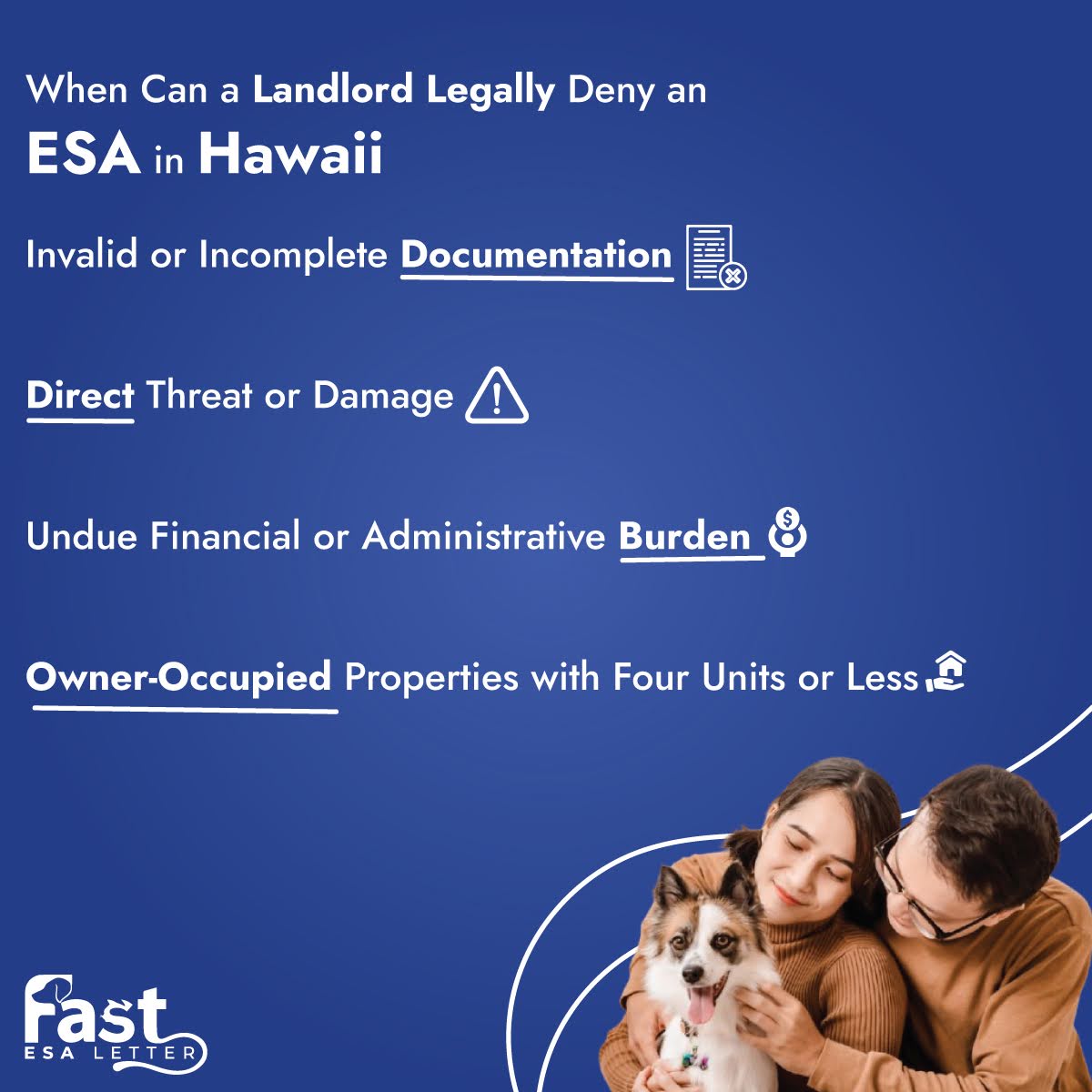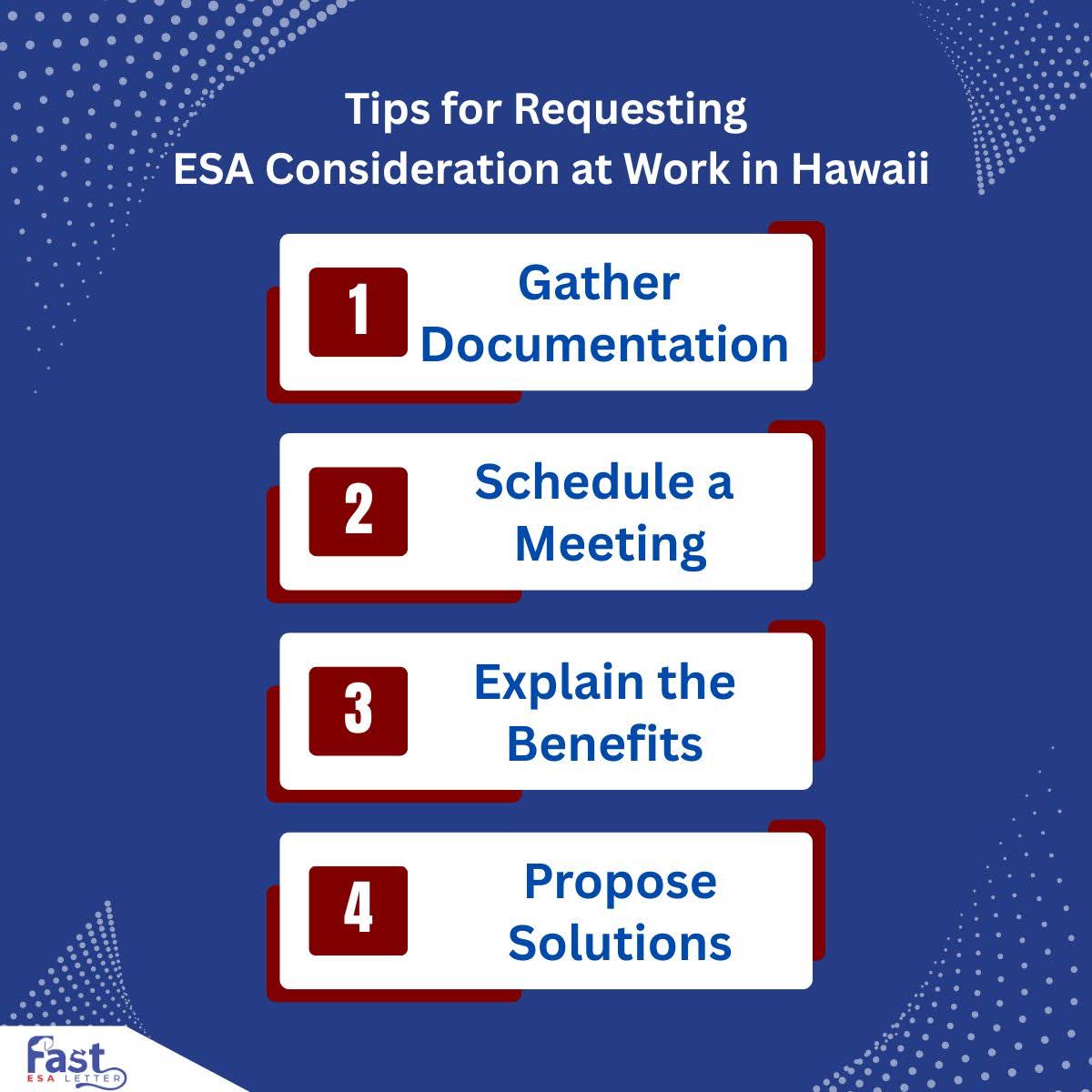What Are the Emotional Support Animal (ESA) Laws in Hawaii?

Robert Clendenin, MD
In Hawaii, while ESAs do not have the same public access rights as service animals, there are still important legal protections in place, particularly when it comes to housing. This guide will explore Hawaii’s ESA laws, helping you understand your rights in the workplace, public spaces, and educational settings. Additionally, we will walk you through the process of obtaining an ESA letter, ensuring that both you and your emotional support animal are fully supported under the law.

What Are ESA Housing Laws in Hawaii?
In Hawaii, individuals struggling with mental or emotional challenges can legally live with an emotional support animal (ESA), thanks to protections granted under the Fair Housing Act (FHA). This federal law overrides restrictive pet policies, giving tenants the right to housing with their ESA—even in “no pets” buildings.
Tenants with a legitimate ESA letter in Hawaii are protected by the following rights:
- Right to Reasonable Accommodation: Tenants can request the presence of an ESA even in buildings with strict no-pet policies.
- No Pet Fees or Deposits: Landlords cannot charge additional fees or deposits for emotional support animals.
- Confidentiality of Medical Information: Landlords may request documentation, but they cannot ask for medical records or diagnosis details.
- Right to Response: Landlords must respond to an accommodation request in a timely manner—typically within 10 days.
- Protection Against Discrimination: Tenants cannot be evicted or denied a lease due to the presence of an ESA, provided they meet the FHA criteria.
When Can a Landlord Legally Deny an ESA in Hawaii?

- Invalid or Incomplete Documentation: If the ESA letter is not from a licensed therapist in ESA Hawaii or lacks essential information.
- Direct Threat or Damage: If the ESA poses a safety risk or has caused significant property damage in the past.
- Undue Financial or Administrative Burden: If accommodating the ESA creates unreasonable hardship for the housing provider.
- Owner-Occupied Properties with Four Units or Less: FHA rules may not apply in these small-scale rental scenarios.
What are Workplace Accommodation Rights for ESAs in Hawaii?
In Hawaii, emotional support animals are not protected under the Americans with Disabilities Act regarding workplace accommodations. Thus, employers are not legally obligated to allow ESAs in offices, shops, or corporate environments.
That said, many employers in Hawaii are becoming more open to supporting mental health initiatives and may consider allowing ESAs on a case-by-case basis—especially if the request is reasonable, well-documented, and doesn’t disrupt the work environment.
Tips for Requesting ESA Consideration at Work in Hawaii
- Gather Documentation: Get an ESA letter from a licensed therapist.
- Schedule a Meeting: Request a formal discussion with HR or management.
- Explain the Benefits: Highlight how your ESA aids your mental health.
- Propose Solutions: Suggest boundaries like designated areas or crates.
- Offer Alternatives: Propose flexible options if an ESA isn’t feasible.

What Are the ESA Laws for Public Access in Hawaii?
Unlike service animals, emotional support animals do not have the same legal right to accompany their handlers in all public spaces. Under Hawaii’s ESA laws, your ESA may not be allowed in restaurants, shopping malls, or public transportation unless explicitly permitted by the business or institution.
However, some local businesses are becoming more ESA-friendly, recognizing the mental health needs of residents. Always call ahead or check the business’s pet policy online to avoid inconvenience.
ESA-Friendly Places in Hawaii
- Kakaʻako Waterfront Park (Oʻahu): A peaceful oceanfront park where leashed ESAs are welcome.
- Lanikai Beach: This tranquil beach is a favorite for early-morning walks with pets.
- The Surfjack Hotel & Swim Club (Honolulu): A pet-friendly hotel known for its casual, animal-loving atmosphere.
- Da HI Brew Café (Kailua): Outdoor seating welcomes ESA dogs.
- Four Seasons Resort Hualalai (Big Island): A luxury pet-friendly resort that offers special amenities for ESA pets.

What are Hawaii’s ESA Laws in Schools and Colleges?
However, colleges and universities tend to follow more flexible guidelines. Under the Fair Housing Act, students living in campus housing may be allowed to keep an emotional support animal, provided they submit proper documentation confirming the need for the ESA due to a diagnosed emotional or psychological condition.
This typically involves submitting a signed letter from a Hawaii-licensed mental health professional. Universities may also require advance notice to arrange appropriate housing accommodations without disrupting the residential environment.
Each institution sets its own ESA policies, but understanding your rights and providing valid, well-prepared documentation can greatly increase your chances of approval.
What Are the ESA Travel Laws in Hawaii?
Air Travel
Since the U.S. Department of Transportation revised the Air Carrier Access Act (ACAA) in 2021, emotional support animals are no longer given special travel privileges. Most airlines now classify ESAs as regular pets, meaning they are subject to pet fees, carrier requirements, and restrictions on cabin travel. Always check your airline’s current pet policy before booking, and prepare documentation in advance to avoid issues at the airport.
Bus Travel
Train Travel
How to Get an ESA Letter in Hawaii?
Obtaining a valid Emotional Support Animal letter in Hawaii is essential for accessing housing rights and ensuring your ESA is recognized under federal protections. Here’s how you can secure one through a legitimate process:
- Connect with a Licensed Mental Health Professional (LMHP) in Hawaii
Start by scheduling an appointment with a Hawaii-licensed therapist, psychologist, psychiatrist, or clinical social worker. The provider must be qualified to diagnose emotional or psychological conditions and licensed to practice in the state.
- Undergo a Clinical Assessment
During the consultation, the LMHP will conduct a thorough mental health evaluation to determine whether your emotional or psychological condition affirms the support of an ESA as part of your treatment plan.
- Receive Your ESA Letter
If the practitioner determines that an ESA would be beneficial to your mental health, they will issue an ESA letter on official letterhead. This letter must include the provider’s license number, type of license, state of issuance, and confirmation that the ESA is recommended as part of your ongoing care.
Conclusion
If you’re considering getting an emotional support animal in Hawaii, be sure to obtain a valid ESA letter from a licensed mental health professional. With proper documentation and a solid understanding of your rights, your ESA can become a valuable and supportive part of your everyday life.
Frequently Asked Questions
Do I Need To Register My Emotional Support Animal In Hawaii?
No, Hawaii laws do not require you to register or certify your emotional support animal. A valid ESA letter from a licensed mental health professional is the only documentation legally recognized.
Can I Have More Than One Emotional Support Animal In Hawaii?
Yes, you can have multiple ESAs if your licensed provider deems each one necessary for your mental health. Your ESA letter must explicitly mention the need for more than one animal, and landlords must accommodate them unless it imposes an undue burden.
Can Landlords Charge Extra Fees Or Pet Rent For ESAs In Hawaii?
How Do I Qualify For An ESA In Hawaii?
Is There A Difference Between A Service Dog And An ESA Under Hawaii Law?
Do Emotional Support Animals Need To Wear A Vest Or Id In Hawaii?
No, ESAs are not legally required to wear identification vests, tags, or special collars. However, doing so may help avoid confusion in shared spaces and demonstrate responsible ownership.
Can My Landlord Verify My ESA Letter In Hawaii?
Yes, landlords can verify your ESA letter by contacting the licensed mental health professional who issued it, but only with your consent. They cannot ask for your full medical records or demand certification.
What Is The Penalty For Misrepresenting An Emotional Support Animal In Hawaii?
Do Emotional Support Animals Have To Be Quarantined In Hawaii?
Can Service Animals Avoid Quarantine When Traveling To Hawaii?
Post Author
Prince Sharma
Related Articles
What Are the Emotional Support Animal Laws in Kansas?
What Are the Emotional Support Animal Laws in Kansas?In Kansas, emotional support animals (ESAs) are protected under federal laws like the Fair Housing Act, which allows them in housing without pet fees, even in no-pet policies. However, ESAs are not...
What Are the Emotional Support Animal Laws in Nebraska?
What Are the Emotional Support Animal Laws in Nebraska?In Nebraska, emotional support animals (ESAs) are protected under federal laws like the Fair Housing Act, which allows them in housing without pet fees, even in no-pet policies. However, ESAs are...
What Are the Emotional Support Animal Laws in Wyoming?
What Are the Emotional Support Animal Laws in Wyoming?In Wyoming, emotional support animals (ESAs) are protected under federal laws like the Fair Housing Act, which allows them in housing without pet fees, even in no-pet policies. However, ESAs are...
Live Free with Your ESA!
An ESA Letter Unlocks Freedom!





